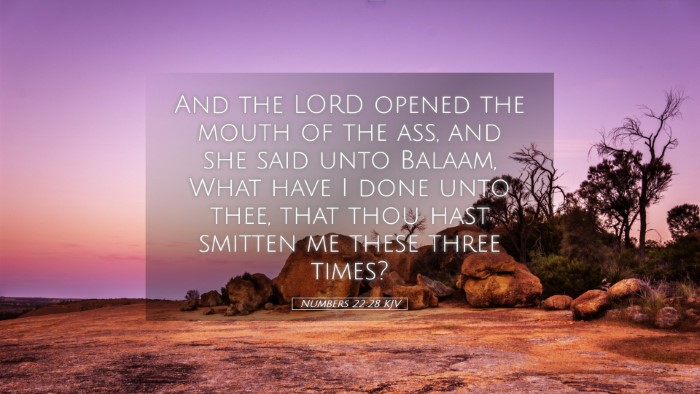Commentary on Numbers 22:28
The verse Numbers 22:28 states: "And the Lord opened the mouth of the ass, and she said unto Balaam, What have I done unto thee, that thou hast smitten me these three times?"
Introduction
This moment in Scripture reveals profound insights into divine communication, the nature of obedience, and the spiritual blindness that can accompany human pride. The passage features Balaam, a prophet of God, who is confronted not only by divine messaging but also by a creature—the donkey he rides. This pivotal scene provides an occasion to reflect on God's sovereignty and the means He employs to bring His will to light.
Contextual Background
Leading to this moment, Balak, the king of Moab, summons Balaam to curse the Israelites. Despite being initially instructed by God not to go, Balaam is swayed by the promise of reward. The narrative underscores Balaam's struggle between divine command and human temptation. The presence of the donkey and her subsequent speaking enhances the story's lessons concerning discernment and the unexpected ways in which God can work.
Theological Insights
- Divine Sovereignty: The act of the Lord opening the mouth of the donkey illustrates God's control over all creation. No creature is outside His authority, and even a lowly donkey can convey His message when human beings fail to perceive it.
- Spiritual Blindness: Balaam’s inability to see the angel of the Lord is symbolic of spiritual blindness that can come from pride and greed. It prompts a self-examination concerning what blinds us from seeing God’s truth in our lives.
- God's Use of Creation to Communicate: The talking donkey symbolizes that God can use any means to communicate His will, emphasizing the need for humility and attentiveness in listening for divine guidance. This highlights God's desire to reach even those who might resist Him.
Comments from Public Domain Commentators
Matthew Henry
Matthew Henry emphasizes God's providential care and the means by which He can deliver wisdom to His people. He notes that Balaam's initial disobedience led to a greater revelation of God's power. Henry remarks on the donkey's speech as showcasing the absurdity of Balaam's actions; he was more unreasonable than the beast he rode. This shows the futility of resisting divine will, as even an animal can recognize God's authority.
Albert Barnes
Albert Barnes provides a detailed examination of the circumstances surrounding Balaam's wayward path. Barnes underscores that the Lord's action in enabling the donkey to speak serves as a stark reminder of the distance one can drift from God's direction. He posits that divine intervention is often necessary when human beings step outside of obedience. Barnes also suggests that this act illustrates God's willingness to reach out and correct through various means, bringing insight to the need for humility in teaching and correction.
Adam Clarke
Adam Clarke interprets the scene with a focus on the miracle of the speaking donkey, which serves as a means of conveying divine wisdom. Clarke suggests that Balaam's reactions allow us to reflect upon our own responses to the prompts of the Holy Spirit. The anthropomorphic portrayal of the donkey raises questions about the profundity of truth found in unexpected places. Clarke urges readers to evaluate the condition of their hearts and whether they are open to the Holy Spirit's workings.
Practical Applications
- Listening to God: Just as Balaam's eyes were opened by the speaking donkey, believers are encouraged to remain vigilant and attentive to God's voice in their lives, whether it comes through Scripture, nature, or circumstances.
- Openness to God’s Direction: Balaam’s path serves as a warning against the distractions of greed and ambition. Pastors and theologians must teach the importance of aligning one's desires with God's will.
- Humility in Leadership: Leaders are called to humility, recognizing that mightier truths can come from simpler sources. Engaging with all of creation can often reveal divine wisdom.
Conclusion
Numbers 22:28 stands as a reminder of the transcendent ways in which God chooses to engage with humanity. Through the unexpected and the humble means of a donkey, the Lord speaks to Balaam, offering profound lessons on pride, insight, and the necessity of divine guidance. For pastors, students, and scholars alike, this passage underscores the critical importance of discernment and attentiveness to God's voice in a world that often seeks to drown it out.


